汉语负迁移对英话学习的影响及应对策略
汉语负迁移对英语语音的影响及其应对策略

汉语负迁移对英语语音的影响及其应对策略运用迁移理论,论述汉语负迁移在英语学习过程中对英语语音的作用。
并且指出,教师在教学中应当根据学习者不同的学习情况以及个体差异,尽量克服负迁移所带来的不利因素。
同时,在教学过程中,也应当正视母语的迁移作用,减少或避免负迁移,以便于学习者能够及时有效地掌握流利准确的语音。
标签:汉语负迁移;英语语音;影响;策略引言在英语学习中,学习者尤其是成年人必定會在某种程度上受他本族语的发音习惯的影响,经常会不自觉地把本族语的发音习惯搬到英语发音上。
相应地,在中国人的英语学习中,也会不同程度地发生此类情况。
鉴于此,本文拟从负迁移的角度讨论汉语对英语语音的影响以及其相应的应对策略。
一、迁移与负迁移RodEllis认为,由于目的语和其他任何已经习得的或尚未完全习得的语言之间存在共性和差异性,由此而造成的影响被称为迁移。
在学习过程中,学习者的母语有时会带来负面影响,由此而造成的影响被称为负迁移。
如果旧知识的迁移对新知识的学习起帮助、促进作用,它就是正迁移;反之,如果旧的知识、经验的迁移妨碍了新知识的获得,它就是负迁移,即干扰。
学习英语过程中,往往正迁移和负迁移是同时发生的。
在某些方面是正迁移,在另一方面又是负迁移。
德国英语教学法教授Butzkamm有一个很好的比喻:“母语不是一件外衣,学习者在踏进外语教室之前可以将其脱下,弃之门外”。
所以,我们不能简单地看待母语迁移,我们要承认它的存在,既要承认它干扰外语学习的一面,也不能否认它的正迁移作用,而是要承认它能帮助我们学好外语。
二、负迁移对英语语音的影响俞理明指出,当学习者接触到外语时,其母语系统已经确立,母语思维习惯亦已形成。
但由于缺乏像母语习得那样的语言环境,学习者在学习外语时就需要付出艰辛的努力对知识加以理解、掌握和运用。
按照行为主义学习理论,原有的习惯会影响新习惯的养成,对第二语言学习者来说,植入大脑中的母语思维可能会干扰母语习得的顺利进行。
汉语思维负迁移 对初中生英语写作的影响及对策
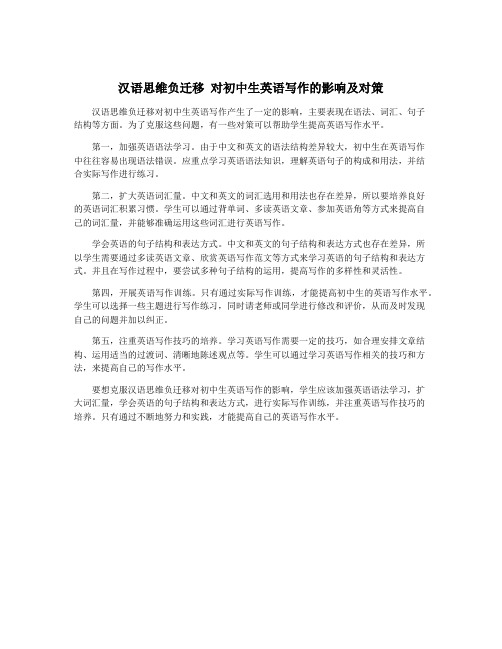
汉语思维负迁移对初中生英语写作的影响及对策汉语思维负迁移对初中生英语写作产生了一定的影响,主要表现在语法、词汇、句子结构等方面。
为了克服这些问题,有一些对策可以帮助学生提高英语写作水平。
第一,加强英语语法学习。
由于中文和英文的语法结构差异较大,初中生在英语写作中往往容易出现语法错误。
应重点学习英语语法知识,理解英语句子的构成和用法,并结合实际写作进行练习。
第二,扩大英语词汇量。
中文和英文的词汇选用和用法也存在差异,所以要培养良好的英语词汇积累习惯。
学生可以通过背单词、多读英语文章、参加英语角等方式来提高自己的词汇量,并能够准确运用这些词汇进行英语写作。
学会英语的句子结构和表达方式。
中文和英文的句子结构和表达方式也存在差异,所以学生需要通过多读英语文章、欣赏英语写作范文等方式来学习英语的句子结构和表达方式。
并且在写作过程中,要尝试多种句子结构的运用,提高写作的多样性和灵活性。
第四,开展英语写作训练。
只有通过实际写作训练,才能提高初中生的英语写作水平。
学生可以选择一些主题进行写作练习,同时请老师或同学进行修改和评价,从而及时发现自己的问题并加以纠正。
第五,注重英语写作技巧的培养。
学习英语写作需要一定的技巧,如合理安排文章结构、运用适当的过渡词、清晰地陈述观点等。
学生可以通过学习英语写作相关的技巧和方法,来提高自己的写作水平。
要想克服汉语思维负迁移对初中生英语写作的影响,学生应该加强英语语法学习,扩大词汇量,学会英语的句子结构和表达方式,进行实际写作训练,并注重英语写作技巧的培养。
只有通过不断地努力和实践,才能提高自己的英语写作水平。
汉语负迁移对英语词汇学习的影响
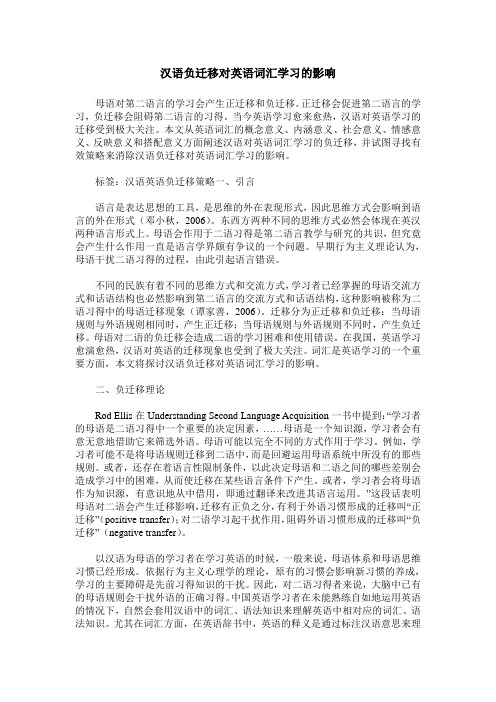
汉语负迁移对英语词汇学习的影响母语对第二语言的学习会产生正迁移和负迁移。
正迁移会促进第二语言的学习,负迁移会阻碍第二语言的习得。
当今英语学习愈来愈热,汉语对英语学习的迁移受到极大关注。
本文从英语词汇的概念意义、内涵意义、社会意义、情感意义、反映意义和搭配意义方面阐述汉语对英语词汇学习的负迁移,并试图寻找有效策略来消除汉语负迁移对英语词汇学习的影响。
标签:汉语英语负迁移策略一、引言语言是表达思想的工具,是思维的外在表现形式,因此思维方式会影响到语言的外在形式(邓小秋,2006)。
东西方两种不同的思维方式必然会体现在英汉两种语言形式上。
母语会作用于二语习得是第二语言教学与研究的共识,但究竟会产生什么作用一直是语言学界颇有争议的一个问题。
早期行为主义理论认为,母语干扰二语习得的过程,由此引起语言错误。
不同的民族有着不同的思维方式和交流方式,学习者已经掌握的母语交流方式和话语结构也必然影响到第二语言的交流方式和话语结构,这种影响被称为二语习得中的母语迁移现象(谭家善,2006)。
迁移分为正迁移和负迁移:当母语规则与外语规则相同时,产生正迁移;当母语规则与外语规则不同时,产生负迁移。
母语对二语的负迁移会造成二语的学习困难和使用错误。
在我国,英语学习愈演愈热,汉语对英语的迁移现象也受到了极大关注。
词汇是英语学习的一个重要方面,本文将探讨汉语负迁移对英语词汇学习的影响。
二、负迁移理论Rod Ellis在Understanding Second Language Acquisition一书中提到:“学习者的母语是二语习得中一个重要的决定因素,……母语是一个知识源,学习者会有意无意地借助它来筛选外语。
母语可能以完全不同的方式作用于学习。
例如,学习者可能不是将母语规则迁移到二语中,而是回避运用母语系统中所没有的那些规则。
或者,还存在着语言性限制条件,以此决定母语和二语之间的哪些差别会造成学习中的困难,从而使迁移在某些语言条件下产生。
汉语负迁移对英语词汇学习的影响
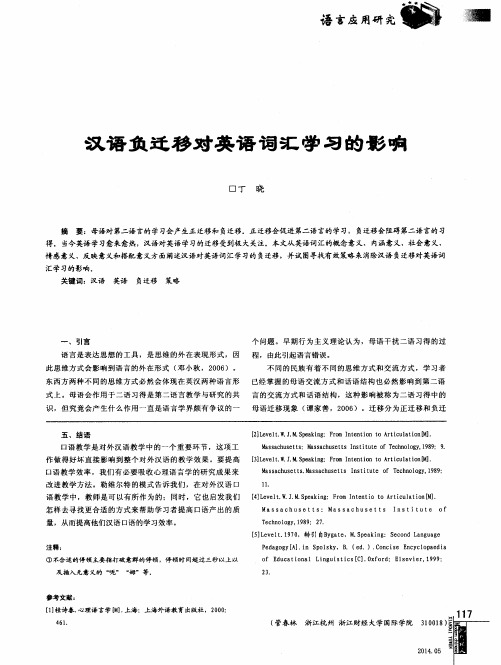
[ 5 】 L e v e 1 t . 1 9 7 0 ,转 引 自B y g a t e ,M . S p e a k i n g :S e c o n d L a n g u a g e
P e d a g o g y 【 A 】 . i n S p o I s k y ,B .( e d .). C o n c i s e E n c y c 1 o p a e d i a o f E d u c a t i o n a 1 L i n g u i s t i c s [ C 】 . O x f o r d :E 1 s e v i e r , 1 9 9 9 :
情感意义、反映意义和搭配意义方面阐述汉语对英语词 汇学习的负迁移 ,并试 图寻找有 效策略 来消除汉语 负迁移对英语词
汇学习的影响。
关键 词:汉语
英语
负迁移
策略
一
、
引言
个 问 题 。 早 期 行 为 主 义 理 论 认 为 ,母 语 干 扰 二 语 习得 的 过
语 言 是 表 达 思 想 的 工 具 , 是 思 维 的 外 在 表 现 形 式 , 因 程 , 由此 引起 语 言 错 误 。 此 思 维 方 式 会 影 响到 语 言 的 外 在 形 式 ( 邓 小 秋 ,2 0 0 6 )。 不 同 的 民族 有 着 不 同 的 思 维 方 式 和 交 流 方 式 , 学 习 者
浅谈英语学习过程中的汉语负迁移

浅谈英语学习过程中的汉语负迁移在英语学习过程中,汉语对学习者的影响是不言而喻的。
有时候,这种影响并不是积极的,而是一种负面的迁移效应,例如汉语负迁移。
汉语负迁移是指,在英语学习中,因为受到汉语语言结构的影响,导致学习者难以正确运用英语语法和句法。
本文将通过分析汉语和英语之间的语法和句法差异,探讨汉语负迁移对英语学习的影响。
汉语和英语语法差异汉语和英语的语法差异十分显著,主要体现在以下几个方面:1.主语和谓语位置在汉语中,主语和谓语通常出现在句子的开头或结尾,例如:“我要吃饭。
”而在英语中,主语和谓语通常出现在句子的中间,例如:“I am going to eat dinner.” 如果汉语母语学习者没有意识到这种差异,就容易出现将英语主语或谓语放错位置的情况。
2.动词时态英语中动词时态非常丰富,包括过去时、现在时、将来时等等。
而汉语则没有严格的动词时态,而是通过上下文来确定动作的发生时间。
这种差异也容易导致学习者在运用英语时出现时态方面的错误。
3.被动语态英语中的被动语态比汉语更为常用,例如:“The book was written by him.” 而汉语中的被动语态则较少使用。
因此,汉语母语学习者在学习英语时,可能没有意识到英语中的被动语态,容易出现主动语态的误用。
汉语和英语句法差异除了语法差异之外,汉语和英语之间还存在较大的句法差异。
以下是几个典型的例子:1.定语从句在汉语中,定语从句通常使用“的”字来引导,例如:“我正在读的书。
” 而在英语中,则是通过关系词(如who、whom、whose)来引导定语从句,例如:“The book that I am reading.” 如果汉语母语学习者没有完全掌握英语的定语从句用法,就容易导致使用错误的引导词或者放错位置。
2.宾语从句宾语从句在英语中比汉语更为常见,例如:“I know that he is coming.” 在这个句子中,“that he is coming”是一个完整的宾语从句。
汉语思维负迁移 对初中生英语写作的影响及对策
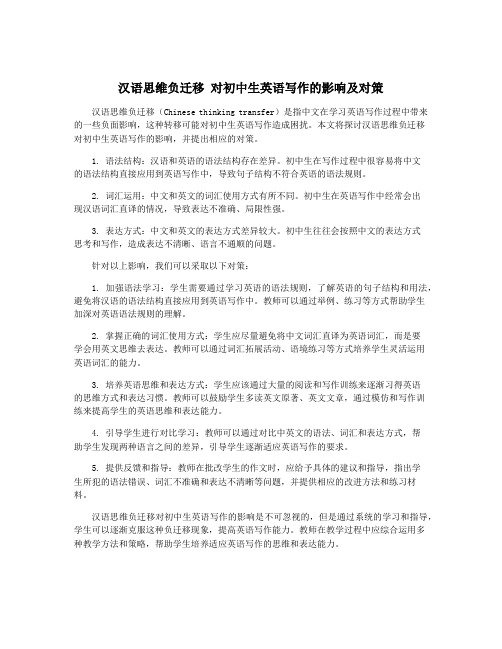
汉语思维负迁移对初中生英语写作的影响及对策汉语思维负迁移(Chinese thinking transfer)是指中文在学习英语写作过程中带来的一些负面影响,这种转移可能对初中生英语写作造成困扰。
本文将探讨汉语思维负迁移对初中生英语写作的影响,并提出相应的对策。
1. 语法结构:汉语和英语的语法结构存在差异。
初中生在写作过程中很容易将中文的语法结构直接应用到英语写作中,导致句子结构不符合英语的语法规则。
2. 词汇运用:中文和英文的词汇使用方式有所不同。
初中生在英语写作中经常会出现汉语词汇直译的情况,导致表达不准确、局限性强。
3. 表达方式:中文和英文的表达方式差异较大。
初中生往往会按照中文的表达方式思考和写作,造成表达不清晰、语言不通顺的问题。
针对以上影响,我们可以采取以下对策:1. 加强语法学习:学生需要通过学习英语的语法规则,了解英语的句子结构和用法,避免将汉语的语法结构直接应用到英语写作中。
教师可以通过举例、练习等方式帮助学生加深对英语语法规则的理解。
2. 掌握正确的词汇使用方式:学生应尽量避免将中文词汇直译为英语词汇,而是要学会用英文思维去表达。
教师可以通过词汇拓展活动、语境练习等方式培养学生灵活运用英语词汇的能力。
3. 培养英语思维和表达方式:学生应该通过大量的阅读和写作训练来逐渐习得英语的思维方式和表达习惯。
教师可以鼓励学生多读英文原著、英文文章,通过模仿和写作训练来提高学生的英语思维和表达能力。
4. 引导学生进行对比学习:教师可以通过对比中英文的语法、词汇和表达方式,帮助学生发现两种语言之间的差异,引导学生逐渐适应英语写作的要求。
5. 提供反馈和指导:教师在批改学生的作文时,应给予具体的建议和指导,指出学生所犯的语法错误、词汇不准确和表达不清晰等问题,并提供相应的改进方法和练习材料。
汉语思维负迁移对初中生英语写作的影响是不可忽视的,但是通过系统的学习和指导,学生可以逐渐克服这种负迁移现象,提高英语写作能力。
中学生英语写作中汉语负迁移现象及对策探析

中学生英语写作中汉语负迁移现象及对策探析汉语负迁移指的是在中学生英语写作中出现的一种错误现象,即学生将汉语语法或用法错误地应用于英语写作中。
这种现象常常使得学生的英语写作表达不准确、语法错误频繁出现,给读者带来困惑或误解。
为了解决这一问题,我们需要探讨其原因,并提出一些对策。
造成汉语负迁移现象的原因有多种:中学生在学习英语过程中会受到母语汉语的干扰。
由于中文与英文在词序、语法结构等方面存在一定差异,学生容易将中文的语法规则应用到英语写作中,从而影响表达的准确性。
中学生英语写作水平相对较低,词汇量有限,所以他们往往用中文中的表达方式去处理英语写作题目,导致了负迁移的现象。
为了解决汉语负迁移现象,我们可以采取以下对策:教师应该及时发现和纠正学生的错误。
在批改作文时,教师可以重点关注学生的错误表达,并给予适当的指导和纠正。
教师应该将语法教学与写作训练结合起来,使学生能够正确理解和运用英语语法规则。
教师可以通过讲解和练习的方式帮助学生理解英文句子结构,学会正确的表达方式。
学生应注重词汇和句型的积累,通过大量阅读和写作练习,丰富自己的词汇量和语言表达能力,从而避免汉语负迁移的现象。
学校和家庭也应加强对学生英语学习的支持和指导。
学校可以组织英语写作比赛、阅读活动等,培养学生的英语写作兴趣和能力。
家庭可以提供多种学习资源,如英语电影、英文原版书籍等,帮助学生进行英语写作的积累和提高。
汉语负迁移在中学生英语写作中是一个普遍存在的问题。
为了解决这个问题,学校和教师需要加强对学生的指导和教育,学生本人也需要注重积累和提高自己的英语写作能力。
只有通过共同努力,才能有效地克服汉语负迁移现象,提高中学生的英语写作能力。
中学生英语写作中汉语负迁移现象及对策探析
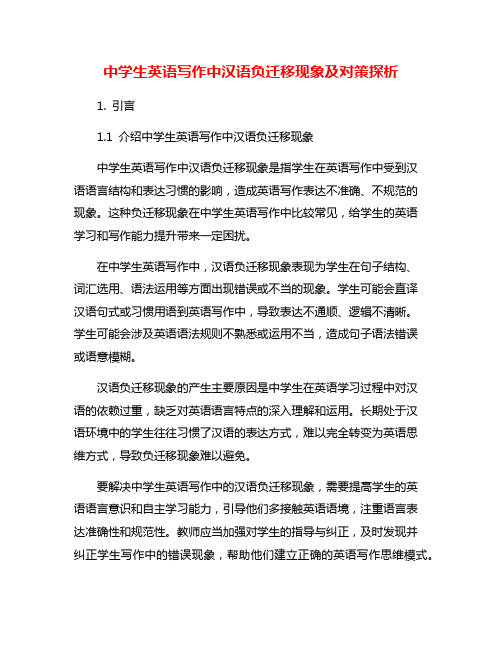
中学生英语写作中汉语负迁移现象及对策探析1. 引言1.1 介绍中学生英语写作中汉语负迁移现象中学生英语写作中汉语负迁移现象是指学生在英语写作中受到汉语语言结构和表达习惯的影响,造成英语写作表达不准确、不规范的现象。
这种负迁移现象在中学生英语写作中比较常见,给学生的英语学习和写作能力提升带来一定困扰。
在中学生英语写作中,汉语负迁移现象表现为学生在句子结构、词汇选用、语法运用等方面出现错误或不当的现象。
学生可能会直译汉语句式或习惯用语到英语写作中,导致表达不通顺、逻辑不清晰。
学生可能会涉及英语语法规则不熟悉或运用不当,造成句子语法错误或语意模糊。
汉语负迁移现象的产生主要原因是中学生在英语学习过程中对汉语的依赖过重,缺乏对英语语言特点的深入理解和运用。
长期处于汉语环境中的学生往往习惯了汉语的表达方式,难以完全转变为英语思维方式,导致负迁移现象难以避免。
要解决中学生英语写作中的汉语负迁移现象,需要提高学生的英语语言意识和自主学习能力,引导他们多接触英语语境,注重语言表达准确性和规范性。
教师应当加强对学生的指导与纠正,及时发现并纠正学生写作中的错误现象,帮助他们建立正确的英语写作思维模式。
通过师生合作,共同努力应对汉语负迁移现象,提升学生的英语写作水平。
1.2 分析负迁移现象产生的原因There are several reasons contributing to the phenomenon of negative transfer of Chinese in English writing among middle school students. Firstly, the differences in grammar between Chinese and English often lead to errors in English writing. For example, Chinese sentences tend to be more concise and lack the use of articles, which can result in students omitting articles or using them incorrectly in English writing.2. 正文2.1 中学生英语写作中常见的汉语负迁移现象中学生英语写作中常见的汉语负迁移现象包括词汇错误、语法错误、逻辑错误等。
- 1、下载文档前请自行甄别文档内容的完整性,平台不提供额外的编辑、内容补充、找答案等附加服务。
- 2、"仅部分预览"的文档,不可在线预览部分如存在完整性等问题,可反馈申请退款(可完整预览的文档不适用该条件!)。
- 3、如文档侵犯您的权益,请联系客服反馈,我们会尽快为您处理(人工客服工作时间:9:00-18:30)。
汉语负迁移对英话学习的影响及应对策略[摘要]在英语学习中,受汉语思维方式和表达习惯的影响,中国的学生常常将汉语的语言结构迁移到英语表达中来,影响英语语言的学习和运用,本文拟以语言学理论及英汉对比理论为依据,从汉语负迁移的角度探讨学生学习中词汇、句法层面等方面出现的错误,并提出一些应对策略,对英语教学起到一定的指导作用。
[关键词]英语学习英文戏剧负迁移策略语言是文化的载体,不同的民族有不同的文化,不同的民族文化必然导致不同的民族心理。
既而影响到人们的思维形式和语言结构的差异。
有关英汉两种语言的对比研究,国内外的专家和学者有综述,对这两种语言的异同进行了多层次的研究。
尤金·奈达在Tanslating Meaning中概括为:汉语为意合(Parata-xis)为主,而英语以形合(Hypotaxis)为主(参见Nada Eugene A,The theory and practice of translation.leiden:E.J.Brill,1982)迁移是个心理学术语,早期仅指先前的学习对后续学习的影响,现在一般认为是一种学习对另一种学习的影响。
著名的二语习得者Odlin总结了二语习得领域数十年来的语言迁移现象研究,给语言迁移下了一个简明而精确的定义:Transfer is the in fluence resulting from similarities and differences between the target language and any other language that has been previously(and perhaps in-perfectly)acquianted.(由于目的语和其他任何已经习得的或尚未完全习得的语言之间存在若性和差异,由此而造成的影响被称为迁移)。
Rod Ellis认为在学习过程中,学习者的母语有时会带来负面影响,由此而造成的影响被称为负迁移(negative transfer)。
在英语学习中,受汉语思维方式和表达习惯的影响,中国的学生常常将汉语的语言结构迁移到英语表达中来,影响英语语言的学习和运用。
由于这种负迁移的影响,我国大学生在英语学习中存在诸多问题。
2006年十一月,为了检验05,06级在校专科生英语综合情况,我校主办了一次英文戏剧比赛。
通过这次比赛,我们发现了学生在平时学习中存在一些中式英语的问题,追根溯源这些还是受汉语负迁移的影响。
本文拟以语言学理论及英汉对比理论为依据,从汉语负迁移的角度探讨学生学习中词汇、句法层面中出现的错误并提出一些策略。
目前,学生英语学习中存在的主要问题是词汇上选词不当,不注意词形的变化,不用冠词,搭配错误,句法上逻辑关系混乱,缺乏必要的连贯与句式变化,语篇上层次不清,用汉英逐字翻译等。
汉语与英语在词汇方面存在较大差异,尤其是词形的变化是区别于汉语的一大特征。
汉字是固定不变的,而英语的名词有数的变化,人称代词有格的变化,动词有人称、数、时态、语态等的变化,此类知识的学习显然需要克服汉语负迁移的影响才能奏效。
英语中的名词通过改变其词形来完成数的变化,而汉语则是通过量词来表达数量的。
而且英语中名词的可数与否与汉语也存在一定的差异,象news,coffee,bread,water物质名词在英语中是作为不可数名词来处理的。
而在汉语中它们却是可数。
受汉语负迁移的影响,中国学生就容易出现 a news/coffee/bread/water式英语。
比如,此次戏剧比赛《借书》中有句台词学生说:Bring me a water!应为:Bring me a glass of wat-er!英语冠词的使用令许多中国学生头痛,有的学生把“我是学生”说成“I’m student.”比如,此次戏剧比赛《猪八戒背媳妇》中,唐僧师徒路过一户人家,扮演孙悟空的学生说:“Look I There is ho-use!”这显然是受到汉语负迁移的影响。
“There is a house.”才是正确的表达方式又比如在戏剧《白雪公主》中有演员说:“I want to eat apple.”正确表达替代是“I want to eat an apple.”究其原因,主要是受汉语负迁移的影响。
各个民族审美观不尽一致,中国传统上比较注重对称美。
汉语中成对连词的使用就体现了这一点,如“因为…所以…”“虽然…但是…”而英语句子却只需要一个连词来引导。
如:Though hewas born in China.he can’t speak Chinese.因此,要避免汉语负迁移的影响,训练用西方人的思维习惯去思维是非常有必要的。
汉语中有些动词在及物方面对英语是起正迁移作用的,如买(buy),看见(see),抓住(seize)等都是作为及物动词使用。
笑(laugh),走(go)等都是做为不及物动词使用。
而有些动词确实起负迁移作用,如发生happen,或take place,出现appear等,汉语中他们常常作为及物动词来用,而英语却是不及物动词。
因此,中国学生在使用此类词语时,经常习惯性的使用被动语态,这显然是受汉语负迁移的影响。
在学生作业中曾出现过这样的句子:By the time you get back,great changes will have been taken place in this area.正确句子应删掉been发生这个单词在英语中无被动语态。
再比如英汉词汇增删情况也需要引起注意,如英语中人称代词使用频繁:wash my face,put up your hands,do my home work等,这些在汉语中却只说洗脸、举手、做作业等。
而唱歌、吃饭、跳舞等这类词语只说sing,dance,eat即可,后面不必再跟宾语。
在教学中,教师应注意引导学生分辨两种语言在表达上的差异,经常总结语言规律,使学生从根本上克服母语的干扰。
英汉两种语言在句形上也存在很大差异。
在回答反意疑问句时,我们习惯上用“是的我不是。
”或“不,我是!”这种前后不一致的表达方式,而英语却必须用“Yse!I am!”“No!I am not!”这种前后一致的方式。
受母语的干扰,学生对此种答词极不习惯,经常出错。
比如在此次戏剧比赛《大话西游》中孙悟空和猪八戒关于天气有这样一段台词。
孙悟空说到“It isn’t cold today,is it?”而猪八戒觉得天气很冷。
反驳到:“Not It is.”这样根据中国人的思维来回答就大错特错了。
正确的回答应该是“Yes!It is!”由此看出,回答一定要和实际情况相符合,“是”就是‘是’,“不是”就“不是”。
也就是说回答反意疑问句要遵循“实事求是”的原则,肯定的回答就用Yes+肯定结构;否定答案就用No+否定结构。
再如英语中否定转移的情况也是一种特殊的表达方式,我们学生受汉语思维的影响在这个方面也容易出现问题。
比如,在戏剧《小老师》中,有句台词” think you ha-yen’t realized the importance of educa-tion.”(我认为你还没有认识到教育的重要性)正确的表达方式应为”I don’t think you have realized the importance of educa-tion.”我们可以得出这样的结论,将think,believe,suppose,expect,fancy,im-agine”等动词后面宾语从句的否定词转移到主句中,即主句的谓语动词用否定式,而从句的谓语动词用肯定式。
有时将动名词,介词短语或整个从句的否定转移成对谓语动词的否定。
如:I don’t remember having seen such a man.(我记得从未见过这样的人)。
It’s not a place where anyone expect to see strange char-actors on the street。
(在这里,人们不会想到在街上会碰见陌生的人。
)有时状语或状语从句中否定词可转移到谓语动词前。
The ant is not gathering this for itself alone(蚂蚁不止为自己采食)。
He was not ready to believe something just because Aristotle said so(他并不认为亚里士多得说过如何如何。
就轻信此事。
)学生在英语学习中出现的问题还有:1、省略:省略主语、宾语、be和小品词等。
蔡基刚(2001)指出,英语属于主语突出(Subject Prominent)语言,要求句中必须有明确的主语,而汉语则属于主题突出(Topic Prominent),因此学生往往会省略主语。
如此次戏剧《大话西游》中有一句台词:But on the other hand also have some people oppose it.应改为:However,some people oppose it.语中名词短语、动词短语、介词短语、形容词、时间状语、地点状语、表条件的短语都可以充当主语,因此。
受汉语主题结构影响,中国学生常把主题当主语。
英语中及物动词后的宾语不可省略,而汉语中大多数动词都是及物动词,若句意清楚,其后的宾语可以省。
学生常说:“I want to earn a lot of and go abroad.”(我要赚很多钱出国)而英语中宾语money不能省略。
正确句应为I want to cain a lot of money and go abroad.2、一直,现代英语属于综合分析语,英语属于典型的分析语,因此英语有形态变化,而汉语没有严格意义上的形态变化。
学生在作业中通常会出现这样的错误:It don’t have its mind。
应改为:It dosen’t have its mind.英语中的代词在人称上要和先行词保持一致,但有的学生在这方面也会出错。
如:Even some pe-ople think we Can get organs from the clo-ne people.其中we应改为they。
3、词序。
在疑问句中英语要求倒装,汉语却无此要求。
因此有的学生会将疑问句的语序弄错。
如戏剧《猪八戒背媳妇中》,孙悟空对猪八戒的。
一句台词:why you come back?应改为Why do you come back?学生有时会生搬汉语词序,生成英语中不会存在的,如:It will make the people fra-id.应改为:It will frighten some people.4、被动句。
有的学生在作文中写道:Most money from parents.应改为:Most money is obtained fro mparents.5、流水句。
